Phlebotomy Career: A Guide to Becoming a Phlebotomist
Are you interested in a career in healthcare that involves direct patient care and a crucial role in the medical field? If so, a career in phlebotomy might be the perfect fit for you. Phlebotomy is the practice of drawing blood from patients for various purposes, such as medical testing, transfusions, or research. Phlebotomists play a vital role in the healthcare industry, as their work helps diagnose and treat illnesses and diseases.
What Does a Phlebotomist Do?
A phlebotomist is responsible for collecting blood samples from patients and preparing them for laboratory testing. Phlebotomists work in a variety of settings, including hospitals, clinics, blood donation centers, and laboratories. Some of the key duties of a phlebotomist include:
- Verifying the patient’s identity and medical records
- Explaining the blood-drawing process to patients and ensuring their comfort
- Selecting the appropriate venipuncture site and drawing blood using various techniques
- Labeling and packaging blood samples for transport to the laboratory
- Maintaining accurate patient records and documentation
How to Become a Phlebotomist
If you’re interested in pursuing a career in phlebotomy, here are the steps you’ll need to take:
Educational Requirements:
Most phlebotomists complete a phlebotomy training program, which can be found at community colleges, vocational schools, or healthcare facilities. These programs typically last a few months and cover topics such as anatomy, physiology, medical terminology, and blood collection techniques.
Certification:
While certification is not always required to work as a phlebotomist, many employers prefer to hire certified phlebotomists. The most common certification for phlebotomists is the Certified Phlebotomy Technician (CPT) credential, which is offered by organizations such as the National Healthcareer Association (NHA) and the American Society for Clinical Pathology (ASCP).
Clinical Experience:
Hands-on experience is essential in phlebotomy, so most training programs include a clinical component where students can practice their skills in a real-world setting under the supervision of experienced phlebotomists.
Benefits of a Phlebotomy Career
There are several benefits to pursuing a career in phlebotomy, including:
- Job Stability: Phlebotomy is a growing field, with an increasing demand for qualified phlebotomists due to the aging population and advancements in medical technology.
- Competitive Salary: Phlebotomists can earn a competitive salary, especially with certification and experience.
- Flexible Schedule: Many phlebotomists have the option to work part-time or on weekends, making it a great career choice for those seeking flexibility.
- Opportunities for Advancement: Phlebotomists can advance their careers by pursuing additional certifications or further education in areas such as medical assisting or nursing.
Conclusion
A career in phlebotomy can be rewarding and fulfilling for those who enjoy working with patients and have a keen attention to detail. By completing a phlebotomy training program, obtaining certification, and gaining hands-on experience, you can embark on a successful career as a phlebotomist. If you’re passionate about healthcare and making a difference in the lives of others, consider a career in phlebotomy.
